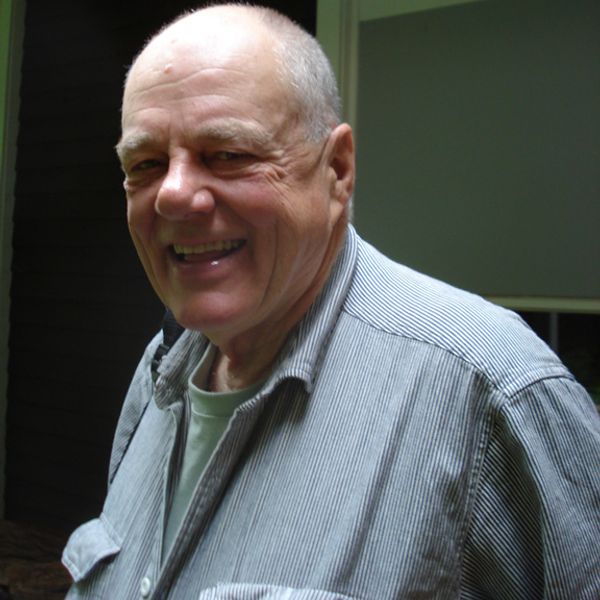Lia Purpura, Wasp Nest (detail), featured in AGNI 102
Agosti
In Nova Scotia tracking the locale
In the realm of a then lying here profound and broad
Peering past and through the knowns of now here on ancestral ground
Hiking in off the road on a trail that an uncle told me he helped cut
A moose cow and calf among windfalls along Benjies Lake
Nearby alongside a beaver lodge another cow shoulder-deep, water-weed grazing
Blackwater boggy deadhead firs flat perfectly silent boreal sky
The nearest cow lifts her head, freshwater wrack, lily pads hanging off her moosehead jaws
Alert ungulate stilt-legged brown magnificence
Hiking back out, five spruce grouse appear trailside from the brush
The males with their black throats and breasts, high-style elegant
Matter-of-fact confidence in their peck and search, peck and peer and scratch, search and mince ahead
The gallinaceous manner of quail, partridges, grouse, turkeys, jungle chickens, tinamou, pheasants, Guinea fowl is satisfying to encounter, anywhere
In their ur-domesticated chicken ways as self-contained, and as amazing, as moose and their intelligence
Back toward town three hundred meters away across French Lake, a huge solitary bull with the stolid dignity of a full rack
When a big bull moose goes into its lofty trot across a pasture or woodlot opening it has a riveting command
Down from French Lake into Chéticamp along the Gulf, the wharves and fish houses, the harbor itself once cod-rich now mostly a port for whale-watch tours
The Governor-General, Chinese born, will arrive soon for an Acadian lunch, community tour, schmoozing in French and English
Acadians deal with bilingualism well, taking it in the natural order of things, not as a cause like nationalistic Québecois
North of its cities Canada becomes tunicate degrees of isolation
Into outports and gravel roads with the bush straight ahead and on both sides
Nova Scotia is an outlying province, Cape Breton the province’s outback, and Cape Breton’s gulf side its farther realm with Newfoundland and Labrador beyond
A grandfather of a great-grandfather, Pierre Aucoin, an original Cheticamper, settled from the fishery of Prince Edward Island
Returned to Nova Scotia by way of the Isle of Jersey, St. Malo, dockside concentration camps in England for the duration of the Seven Years War following a winter on a British prison ship in Virginia’s Hampton Roads
All after a Cobequid boyhood up the Acadian shore from Port Royal
His son was a great-great-grandfather, with one eye blue, one eye brown
Another forebear died lost on drift ice far outside in the Gulf. His bones were found with a note that read in translation, “My name was Placide Aucoin. Anyone who finds my remains, please bury them”
Occasionally there a bald eagle wheels overhead, somewhat as distant but friendly ancestral ghosts seem to follow occipital on Chéticamp’s main street
Like Borges’s unseeable companion
Mud rooms, steep roofs, double-sash windows, stacks of stove wood at the snug houses up and down the Chéticamp littoral
Usually there’s not a lot of snow because of the Gulf and the ocean nearby
But winter is relentlessness from the first cold-rain September squalls to the April frosts
Down East, far, far Down East
Poking around Chéticamp, the harbor front and the island, the Cabot Trail’s overlooks, imagining Mamère’s early-century girlhood
Looking out to sea
Aunt Jo, in Middle River down the line living with one of her daughters, “Nobody knew your mother, nobody. She was always apart”
On the way out find photographs of Uncles Joe and Alex in the Margaree Salmon Museum that lies on the Margaree, the famous salmon river
They were notable mid-twentieth-century fishing guides
Farther south, Maitland on the Minas Basin, Cobequid Bay near Truro, the Acadian eagre, the highest tides of all. On the bluff under midnight moon, the tide was out
The tidal bore arrived in the morning an hour after sunup
The French who sailed from La Rochelle to Nouvelle-Écosse had been in Canada for three generations when the British, many up from Massachusetts for the spoils, occupied the rich Acadian polder lands by force
When Truro was named Cobequid and the Salmon River that runs through it was called the Aucoin
Pierre, the grandfather of my mother’s Grandfather Aucoin, and six thousand others were taken off their farms and deported on those British prison ships
Such are the ways of disfranchisement, exile, and return
Bluer and paler than myrtle. Bluer, lighter, stronger, than laurel green
Sea green
Seawater green
Spruce green
Back south and west from Halifax, back from way Down East toward home
Where peridot is woodbine green
Down the line in lowering sun late-summer afternoon, watch a bald eagle over Cash Lake in Pautuxent National Wildlife Refuge
Cape Breton bald eagles, Chesapeake bald eagles the same
The same coast, inlets, bays, river mouths, and estuaries
In the time of now, the time of then
The same place, on the coastal course of Pierre Aucoin’s prison ship bound for its Hampton Roads typhoid winter

D. E. Steward
D. E. Steward is in his twenty-sixth year of months in the mode of his AGNI Online pieces “Maggiot,” “Juino,” and “Agosti.” Other months in this project have appeared in Conjunctions, The Massachusetts Review, and elsewhere. Written serially, month to month, many have autobiographical reference, but the project is not an extended Jahrbuch. It has affinity to Cyril Connolly’s The Unquiet Grave, and Evan S. Connell’s two books of a similar kind. Well over half the 306 months in the project have been published in magazines. Another Mexican border month, “Avrila,” appears in Conjunctions 53. (updated 5/2012)
